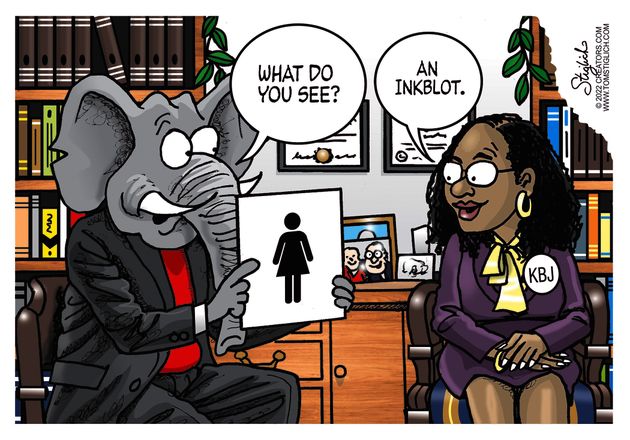annabenedetti
like marbles on glass
The Senate voted to confirm Judge Ketanji Brown Jackson as the newest member of the United States Supreme Court on Thursday, delivering on President Joe Biden’s vow to successfully nominate the first Black female associate justice in the court’s history.
The confirmation of a judge whose nomination has received broad public support nevertheless came through by a narrow vote of 53-47, a tally cut almost entirely along party lines and nearly matching the vote margins of much more controversial nominees.
Republican Sens. Susan Collins (ME), Lisa Murkowski (AK) and Mitt Romney (UT) joined their Democratic colleagues in supporting Jackson.
Jackson, who held the same seat on the U.S. Court of Appeals for the District of Columbia once occupied by Attorney General Merrick Garland, was long seen as the presumptive nominee for first vacancy on the court under Biden. In addition to fulfilling Biden’s campaign-era vow to “making sure there’s a Black woman on the Supreme Court,” the 51-year-old judge has a lengthy résumé as a jurist and attorney that features many of the accomplishments seen as prerequisites for a spot on the court: two degrees from Harvard University, both with honors; a Supreme Court clerkship under the justice she is now set to replace; and eight years as a district court judge following a unanimous confirmation vote in 2013. . . .
Capitol staff crowded into the Senate chamber to observe the historic vote, which was presided over by Vice President Kamala Harris, the first Black woman to serve in that office. Several members of the House Congressional Black Caucus lined the Senate floor to observe the milestone firsthand.
In her testimony before the Judiciary Committee, Jackson promised to make the principle of “Equal Justice Under Law”—the words inscribed on the edifice of the Supreme Court itself—“a reality and not just an ideal.”
“I have been a judge for nearly a decade now, and I take that responsibility, and my duty to be independent, very seriously,” Jackson said in her opening remarks before the committee in March. “I evaluate the facts, and I interpret and apply the law to the facts of the case before me without fear or favor, consistent with my judicial oath. I know that my role as a judge is a limited one.”
. . . . In addition to being the Supreme Court’s first Black woman justice—and only its third Black justice ever—Jackson breaks the mold of justices in subtler ways. A former assistant federal public defender, now the first justice since Thurgood Marshall to have worked in criminal defense, Jackson once worked to reduce disparities in drug offense sentences. In her brief tenure on the U.S. Court of Appeals—she was confirmed to her current seat last year—Jackson ruled against former President Donald Trump in his bid to block the release of White House records pertaining to the Jan. 6 attack on the U.S. Capitol, writing in her decision that “presidents are not kings.”
The confirmation of a judge whose nomination has received broad public support nevertheless came through by a narrow vote of 53-47, a tally cut almost entirely along party lines and nearly matching the vote margins of much more controversial nominees.
Republican Sens. Susan Collins (ME), Lisa Murkowski (AK) and Mitt Romney (UT) joined their Democratic colleagues in supporting Jackson.
Jackson, who held the same seat on the U.S. Court of Appeals for the District of Columbia once occupied by Attorney General Merrick Garland, was long seen as the presumptive nominee for first vacancy on the court under Biden. In addition to fulfilling Biden’s campaign-era vow to “making sure there’s a Black woman on the Supreme Court,” the 51-year-old judge has a lengthy résumé as a jurist and attorney that features many of the accomplishments seen as prerequisites for a spot on the court: two degrees from Harvard University, both with honors; a Supreme Court clerkship under the justice she is now set to replace; and eight years as a district court judge following a unanimous confirmation vote in 2013. . . .
Capitol staff crowded into the Senate chamber to observe the historic vote, which was presided over by Vice President Kamala Harris, the first Black woman to serve in that office. Several members of the House Congressional Black Caucus lined the Senate floor to observe the milestone firsthand.
In her testimony before the Judiciary Committee, Jackson promised to make the principle of “Equal Justice Under Law”—the words inscribed on the edifice of the Supreme Court itself—“a reality and not just an ideal.”
“I have been a judge for nearly a decade now, and I take that responsibility, and my duty to be independent, very seriously,” Jackson said in her opening remarks before the committee in March. “I evaluate the facts, and I interpret and apply the law to the facts of the case before me without fear or favor, consistent with my judicial oath. I know that my role as a judge is a limited one.”
. . . . In addition to being the Supreme Court’s first Black woman justice—and only its third Black justice ever—Jackson breaks the mold of justices in subtler ways. A former assistant federal public defender, now the first justice since Thurgood Marshall to have worked in criminal defense, Jackson once worked to reduce disparities in drug offense sentences. In her brief tenure on the U.S. Court of Appeals—she was confirmed to her current seat last year—Jackson ruled against former President Donald Trump in his bid to block the release of White House records pertaining to the Jan. 6 attack on the U.S. Capitol, writing in her decision that “presidents are not kings.”


